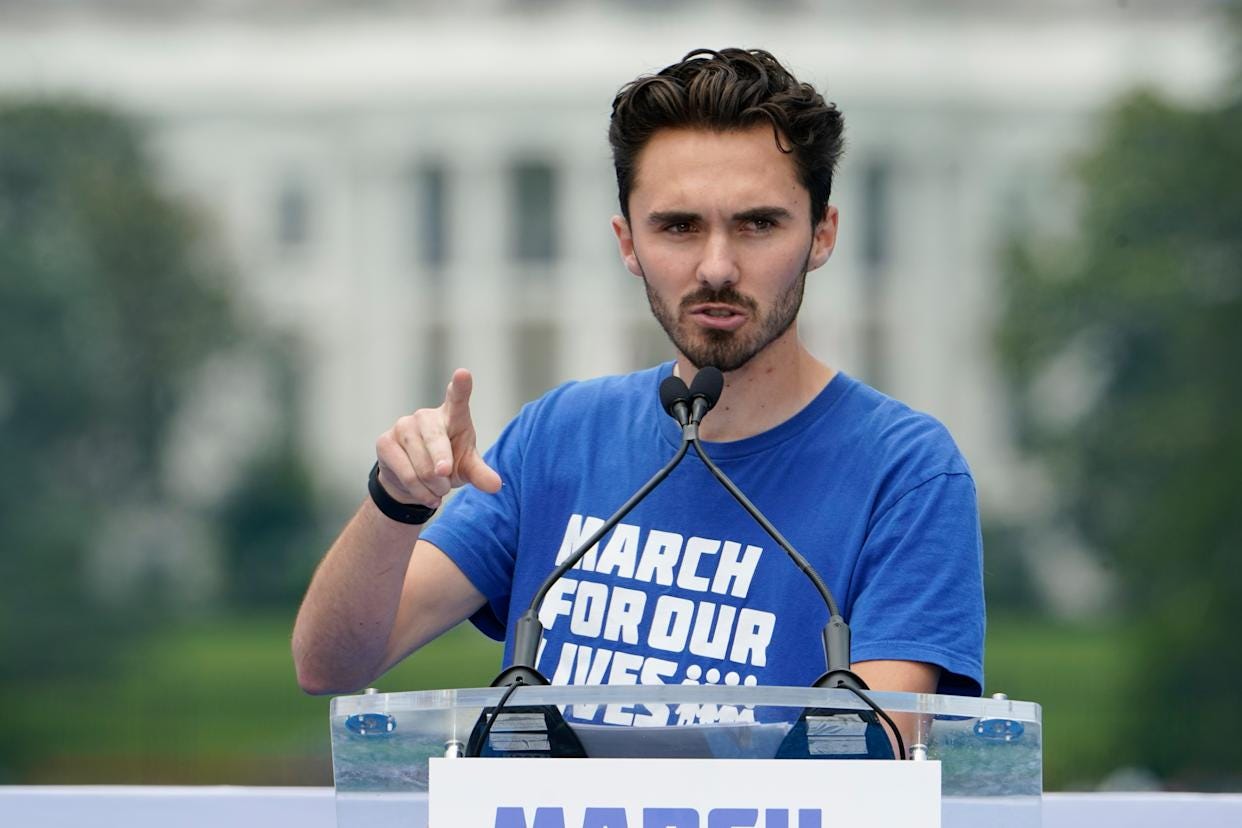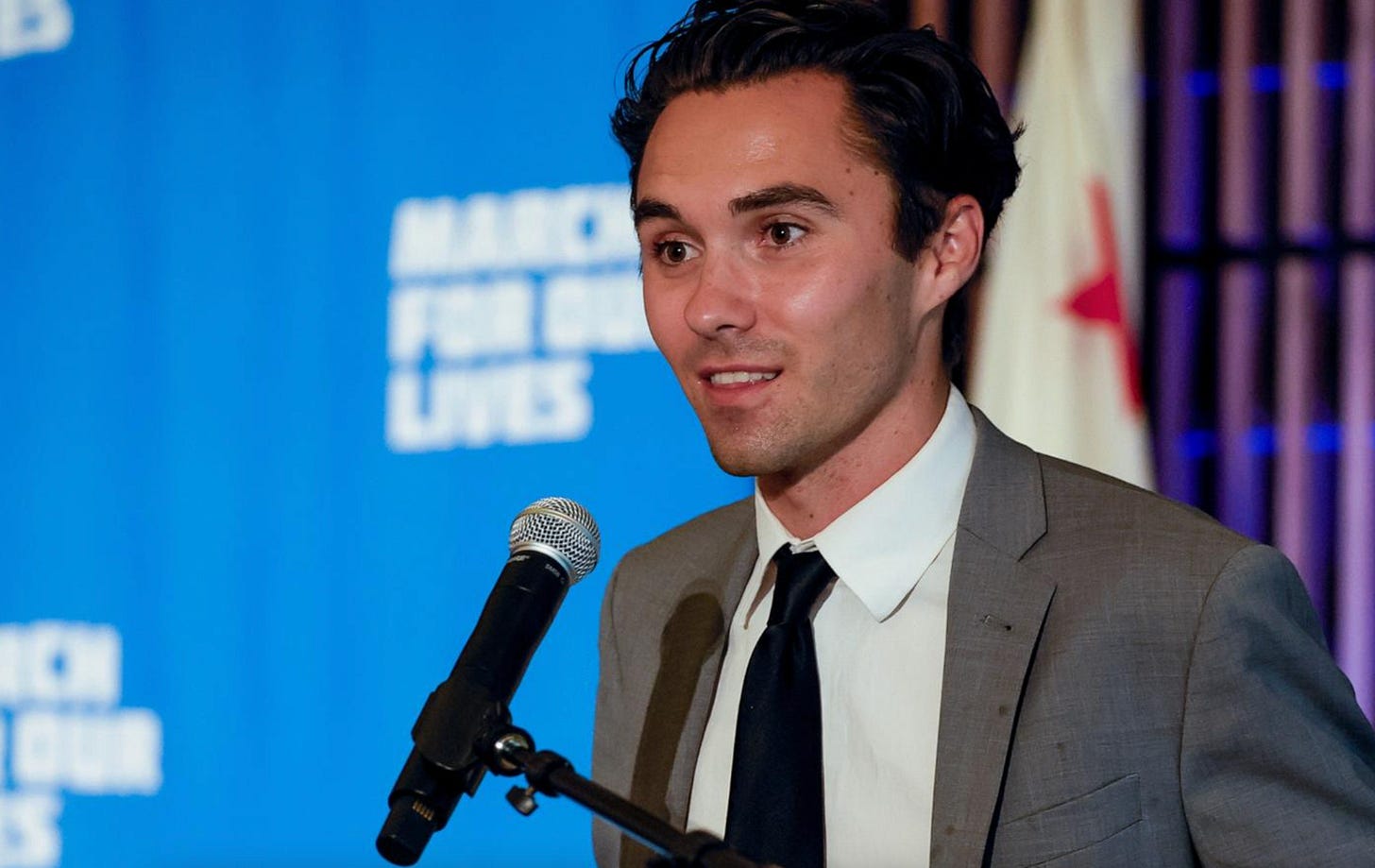"Step Aside:" Young Dems Are Done Waiting
Get on board, or get out of the way.
Sponsored by
David Hogg is only 25 years old, but he’s already one of the top leaders of the Democratic Party. And as the newly elected vice chair of the Democratic National Committee (DNC), he’s not following the usual playbook.
Instead of staying neutral in primary contests, the way party officers usually do, Hogg is part of a new movement inside the party that’s pushing for generational change. He’s channeling a growing frustration from young Democrats who feel like their voices are being ignored by the party leaders who’ve been in power for decades.
In a number of congressional districts across the country, young Democratic candidates have already announced plans to challenge their party elders. And a startling poll recently found that if Alexandria Ocasio-Cortez, the 35-year-old progressive who represents a New York House district, were to challenge 74-year-old Senate Majority Leader Chuck Schumer for his Senate seat, she would enjoy a double-digit lead among likely Democratic voters.
Young Democrats are looking for leaders who understand their world — people who grew up during school shootings, economic recessions, and the Covid pandemic. Leaders who aren’t afraid to challenge the system, even if that means going after powerful people in their own party. You’ve had your chance, the message seems to be. You’re not addressing our problems. Now step aside.
What is Hogg doing?
Hogg, who first came to prominence as a survivor of the 2018 Parkland school shooting in Florida, helped start Leaders We Deserve. It’s a political action committee (PAC) focused on electing progressive candidates aged 35 and under to national office, or people to state office who are 30 and under. The PAC wants to see candidates who support things like gun reform, climate action, abortion rights, and student debt relief. Their goal? Replace long-serving Democrats in safe blue districts with younger, bolder leaders. Leaders who came of age facing the issues that animate many Democratic voters, and will live for a long time with the repercussions of today’s decisions.
Hogg’s PAC plans to spend $20 million backing young Democratic candidates. But he says it’s not just about age — it’s about fresh leadership and urgency.
“What we are not saying here is, ‘Oh, you’re old, you need to go,’” Hogg told the New York Times. “What we’re saying is we need to make room for a new generation to step up and help make sure that we have the people that are most acutely impacted by a lot of the issues that we are legislating on — that are actually going to live to see the consequences of this.”
In a separate interview, Hogg said, “We obviously support younger candidates who are running for office; however, we’re not here just to challenge somebody because they’re above a certain age. It’s not to say it’s out with the old and in with the new. I would say it’s more accurate to say it’s out with the ineffective and in with the effective.” Hogg believes the Democrats are in danger of losing young voters for good if they doesn’t start running candidates who are more focused on their concerns. And the data shows that young voters are indeed dissatisfied. A recent CNN poll found that only 30% of Americans aged 18 to 34 approve of the Democratic Party.
From our sponsor:
Free Filet Mignons for a Year + $60 Off
ButcherBox delivers high-quality meat and seafood with clean, simple ingredients - no added hormones or antibiotics ever.
Right now, readers of The Preamble get 2 free filet mignons in every box for a full year plus $60 off—that’s $20 off your first 3 boxes when you use code PREAMBLE at checkout.
No junk. Just premium proteins, unmatched value, and total peace of mind.
Take advantage of this offer here.
Will they stay or will they go?
Hogg hasn’t shared any names on his target list yet, but he told the Washington Post he’s focusing on solid-blue House districts where younger progressives can challenge longtime Democratic incumbents. Because these districts are considered “safe” for Democratic candidates, even if there is a big primary fight and some voters stay home because their preferred candidate is no longer in the race, it would still be unlikely that the Republican candidate would win. Hogg also says he won’t be challenging certain high-profile Democrats, because he still sees them as effective leaders.
“I have faith in [Nancy Pelosi], and I also have faith in people like James Clyburn,” Hogg said. “I have faith in people like Steny Hoyer as well, that if the moment comes where they feel like they are not able to meet this moment anymore, that they will do the right thing and step aside and not run again.”
Some longtime Democratic lawmakers might be facing challenges soon. Representative Stephen Lynch of Massachusetts, who’s been in office since 2001 and is seen as more conservative than many in his party, could be one of them. The New York Times recently reported that Patrick Roath, a former aide to a governor of Massachusetts, was considering a primary challenge against Lynch. “It’s not an age thing explicitly,” Roath said. “But these jobs, they’re not meant to be held for decades.”
Other older lawmakers are already stepping down on their own, and while they have not specifically said, “I don’t want to get primaried by a younger candidate,” the effect is the same. Senator Dick Durbin recently announced he won’t run again, after 30 years in the Senate. Representative Jan Schakowsky is expected to retire after 14 terms. Schakowsky was already facing a primary challenge from Kat Abughazaleh, a young media influencer, although Abughazaleh was not expected to win.
A generational wave
There’s a wave of young progressives within the party who aren’t satisfied with small tweaks and safe politics. At least five Gen Z and Millennial candidates under 40 have recently started campaigns to take on longtime Democratic members of Congress in solidly blue districts across the country.
One of the challengers is Elijah Manley, a 26-year-old substitute teacher from Florida. He says he’s had enough of watching Democrats play it safe, especially when it comes to standing up to Trump. “We're not going to win every battle," he said. “But if we don't even put up a fight, what are we doing?”
Not everyone’s a fan
Hogg’s strategy hasn’t gone over well with everyone. Some Democratic leaders say he’s risking party unity at a time when defeating Trump should be the top priority. They also think Hogg is acting inconsistently with his duties as a Democratic Party officer by taking sides in primary fights.
Top House Democrat Hakeem Jeffries says he supports all current Democratic incumbents. And DNC Chair Ken Martin has proposed a rule (some might call it an ultimatum) that would force party officers like Hogg to stay neutral during primaries. If that rule passes, Hogg might have to step down from the DNC — or break ties with his PAC.
Hogg says he won’t back down. “I’m going to fight to remain in this [DNC vice chair] position because I believe I can serve the party,” he said. He added that he “is not using the DNC’s resources in these races” and is “abiding by what the current bylaws are.”
Hogg’s group recently donated $100,000 to the Democratic Congressional Campaign Committee — which traditionally backs incumbents.
Still, in announcing the donation on X, Hogg made a point of saying, “This is not me playing nice. It is demonstrating my commitment to winning back the house.” And he made clear that he still thinks winning back the House will require the ouster of current officeholders who are behind the times: “We need a better Democratic Party and need to get rid of the Democrats in safe seats who do not understand what is at stake right now.”
Since Hogg’s PAC was founded in August 2023, it has raised more than $11 million in contributions from a large number of contributors. About 64,000 itemized donations, which are typically larger in size ($200 or more, although campaigns can list smaller amounts) — added up to around $3 million. Smaller, unitemized donations made up around $7 million, and the rest came from other sources, according to reports filed with the Federal Election Commission.
Whether Hogg manages to get new candidates elected with those funds — and to keep his DNC post while he tries to do so — remains to be seen. But suddenly the halls of power don’t seem quite so far out of reach for a generation that’s tired of waiting.










I admit that as an Elder Millennial I was starting to roll my eyes: yeah, yeah, younger generation wants older generation out (but doesn’t show up to vote in nearly the same numbers). But reading the whole article, I admit that eye roll was misplaced and I appreciate that Hogg articulates well that it’s not *just* about age. His willingness to admit and even champion nuance is refreshing. Thanks for writing!
I am 73. I will donate to Hogg’s pac.